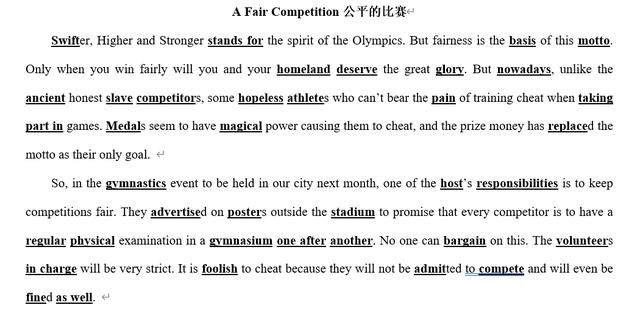前一篇文章,我们说过记单词非常重要。那么,记住单词后如何才能不遗忘呢?
要知道,一个单词相当于一个点。你记住了很多毫无顺序的点,就会很容易忘记。如果把这些点排列起来,画成一幅图或者讲一个故事,就不容故意遗忘了。比如:把单词放在文章中,就会形成单词在句子中的前后文关系,这样我们记住的是一个故事,也就是一条线或者说一个面。而记住一个点容易忘记,记住一个故事就不会总是忘记了!
今天我们就以人教版必修一unit4《Earthquake》的单词为例,创作一篇文章:

地震中的道路
A Horrible Earthquake可怕的地震
Dirty water rose in wells and canals before the earthquake. But no one judged that an earthquake was coming. Suddenly, everything shook. It seemed as if the world was at an end. Millions of brick houses and a number of dams were destroyed. Railway tracks became useless bars. Pipes in mines burst and let out smelly steam. Huge cracks trapped cyclists everywhere.
The next day, this event was the headline or main title of all newspapers. With the reporters giving an outline of the disaster, the whole nation was shocked by the damage and the victim’s extreme suffering. People were moved when they read that the survivors comforted each other by saying “Congratulations! You survived!”. So they not only expressed their sympathy sincerely, but also organized together to help the victims right away. The injured were rescued and the dead were buried. The frightened survivors were dug out from under the ruins and were offered shelter, fresh water and electricity. Thanks to people’s help, the loss was minimized.
地震前,水井和运河里的污水都涨涌起来。但是却没人判断出地震即将来临。霎那间,一切都在摇晃,似乎整个世界就要结束。数以百万的砖房和许多水坝遭到破坏;铁路轨道都变成无用的铁条;煤矿管道纷纷爆裂,发出有臭味的蒸汽;到处都有骑车的人被巨大的裂缝陷住。
第二天,所有报纸都纷纷以大字标题或主要标题报道了这一事件。记者们描述了灾难的大概情况,全国都被地震的破坏和灾民们极度的苦难所震惊。当人们读到幸存者以“恭喜啊,你还活着。”来互相安慰时,都被感动了。人们不仅衷心地表达了他们的同情,而且还立刻组织起来帮助灾民。伤员被救助了,死者被埋葬了,吓坏的幸存者被从废墟中挖出来了,栖身处、净水和电力也很快得到提供。多亏了人们的帮助,灾区的损失被减到了最小。
这篇文章主题和课本文章完全契合。同时,将学过的单词和新单词结合起来进行了故事的描述。更加有利于学生的单词记忆。

这样的文章一共有40篇,包含了高中英语必备的3500 个单词。
比如必修二unit2《The Olympic Games》先关联的文章:


有需要的话快快保存吧!
,




